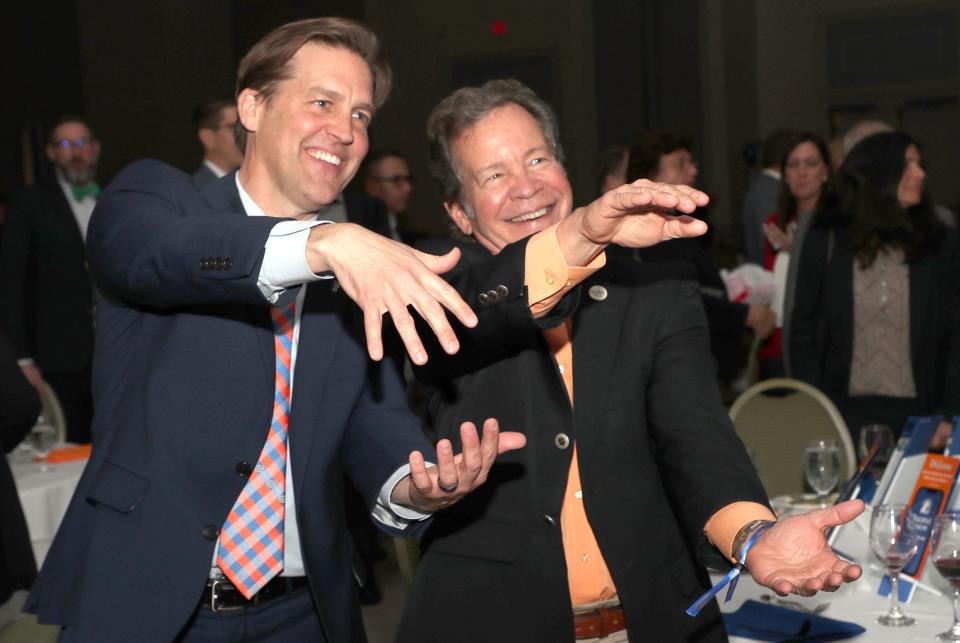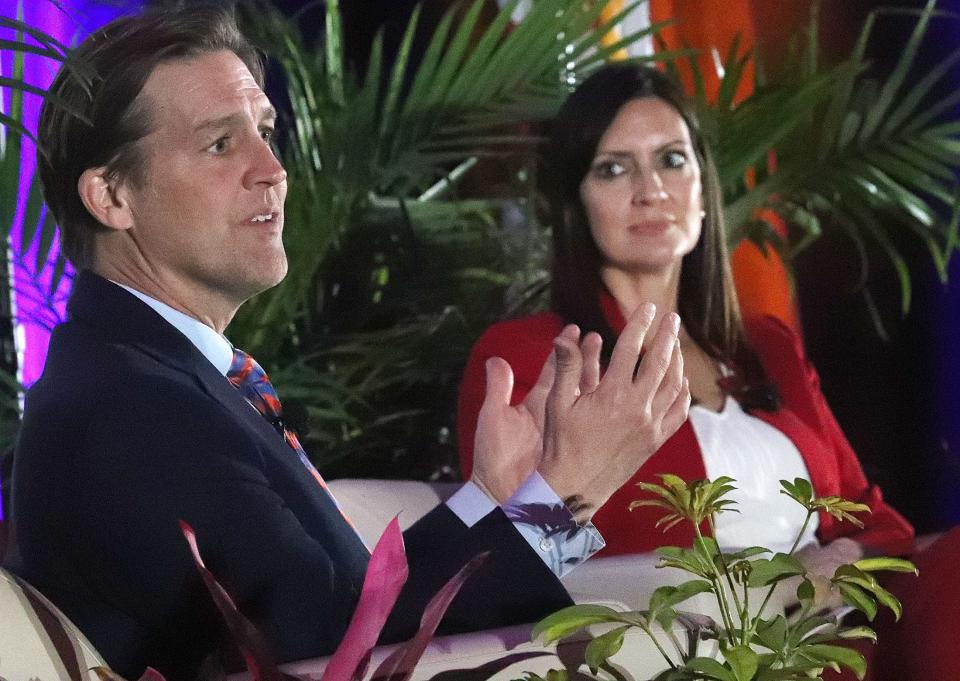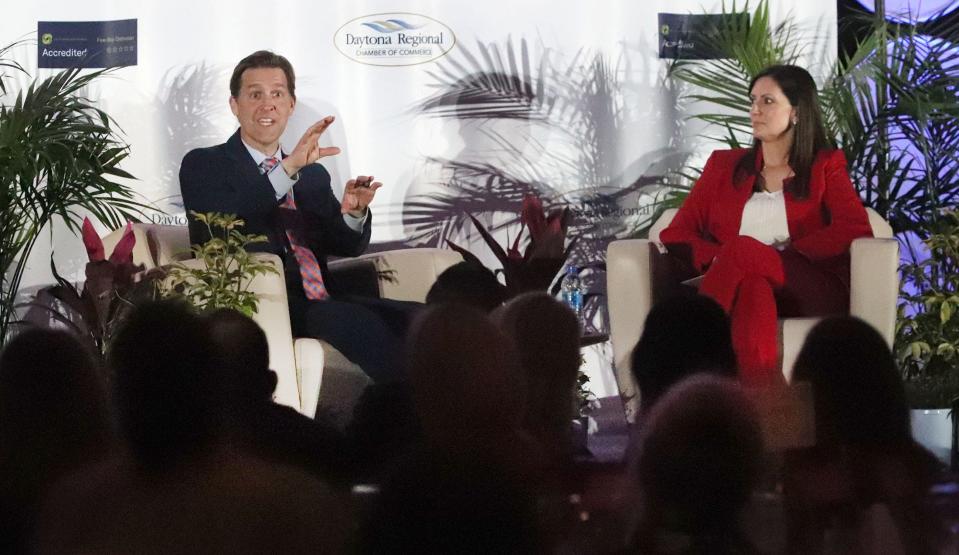New University of Florida President Ben Sasse: Higher ed must serve lifelong learners
- Oops!Something went wrong.Please try again later.
For the first time in human history, the average worker at age 30 is not expected to be in same career field by age 50, said Ben Sasse, who began his presidency at the University of Florida on Monday.
So now more than ever, the job for higher education is to be accessible to lifelong learners.
Sasse spoke to an audience of about 400 at the 103rd annual Daytona Regional Chamber of Commerce meeting at one of the the Hilton Daytona Beach Oceanfront Resort ballrooms Tuesday night. In Daytona Beach, 100 miles to the east of Gainesville, there was no hint of the campus protests that have accompanied Sasse's hiring.
The event was set up as a "fireside chat," with Sasse sitting to the right of Lt. Gov. Jeanette Núñez, who asked him about world affairs and the future of higher education. It was arranged by Mori Hosseini, chair of the University of Florida Board of Trustees and a Volusia County homebuilding magnate, and also attended by Florida House Speaker Paul Renner, Senate President Kathleen Passidomo, state Rep. Tom Leek, R-Ormond Beach, and other Tallahassee officials.
Núñez asked why Sasse about his recent career change.
"Resigning from the U.S. Senate is not for the faint-hearted and it was, certainly, I would imagine, a decision that took a lot of reflection, a lot of prayer," she asked. "What was it that made you resign a very important post, only 99 other of your favorite people from around the country have that unique opportunity to serve in the U.S. Senate?"

"Have you met Mori?" Sasse deadpanned.
He added he believes in the model created by George Washington, who gave up his power as president after two terms.
"I thought that I would stay for the rest of my second term and then probably go and run a private equity fund's ed-tech and workforce disruption fund," he said.
Almost everybody in human history has had "lifelong work," dating back to nomads, hunter-gatherers and agrarians, Sasse said. When the Industrial Revolution arrived, people had their choice of jobs, but typically only once, between ages 14 and 22, and then they would remain in that career until retirement.
Sasse said the question workers ask that correlates to their happiness is whether or not they matter, whether or not someone needs them, more than how much money they make.
"We are the first civilization ever that's going to have to create lifelong learning for the whole population," he said. "It's very daunting and super-exciting at the same time, and I thought only ed-tech and tech-finance was going to be entrepreneurial enough and innovative enough to be in a place to help navigate that question and so I told search committees for university presidencies that I wasn't interested.
"There was not going to be a university out there that was going to be both sufficiently scaled and not complacent. That if you're scaled, you're going to be fat and happy and lazy and complacent, or if you're entrepreneurial, it might be pretty, but you might have an institution that's touching the lives of four or five or nine hundred people," he said. "I didn't think there could be a big-scale institution that also had an entrepreneurial board and leadership team and culture until Mori kept calling and calling and calling and calling, and I realized UF is an extraordinarily deep place."
The university has attracted not just Sasse, but thousands of Florida families, clamoring to gain admittance into UF, Núñez said, asking for advice.
Sasse sidestepped going into depth on tips for parents, but noted the university has about 6,000 open slots with about 71,000 applicants.
"A lot of people have done a ton of work to upgrade the quality of education in the state. Incredibly impressive, but one of the downsides of that is you get more and more competitive to try to get into those institutions," Sasse said. "I am well aware of a lot I have to learn about that process."

"Higher education has the sense that the way our institutions looked 40 or 50 years ago is the way they look today and the way they're going to look in 40 or 50 years from now. And that's almost certainly a wrong assumption," Sasse said.
"We're going to enter a world where people are going to experience or need higher education many, many times over the course of their life. But it's not going to be, again, a full-time residential experience, where you move back to an idyllic, pastoral community like lovely Gainesville and you stay there from age 34 to 38," he said. "The idea that education is one-and-done is a bad idea."
Sasse said the economy is "overwhelmingly driven" by quantification. "And when computer power falls to a marginal cost of zero, it means that anything we do as people that can be automated is ultimately going to become nearly free, a rounding error to free, and that means human labor is not going to do those things any more," he said.
Citing a study by consulting giant McKinsey & Co., one of his former employers, Sasse said more than 70% of today's jobs are already more than 30% automatable by already-available technologies.
"It isn't that when new technology comes some job immediately ends," Sasse said. "It means that jobs that exist are going to be unbundled and rebundled," Sasse said.

He noted when the ATM was invented in London in the late 1960s, it spelled the end of jobs for bank tellers. While there was some truth in that, Sasse said ultimately what happened was while the average bank branch went from needing 26 bank workers to needing nine, the number of bank branches in the United States exploded −resulting in more bank tellers today than in 1969.
"Technology is going to disrupt us in ways we can't anticipate now, but the one thing that's certain is every human, the value-added ... is going to be because we have brains and problem-solving abilities, not merely because we have brawn and the ability to do repetitive tasks," he said. "And the future of higher ed has got to think a lot more about what it means to create people who are curious forever."
This article originally appeared on The Daytona Beach News-Journal: UF President Ben Sasse addresses why he left his seat in U.S. Senate

